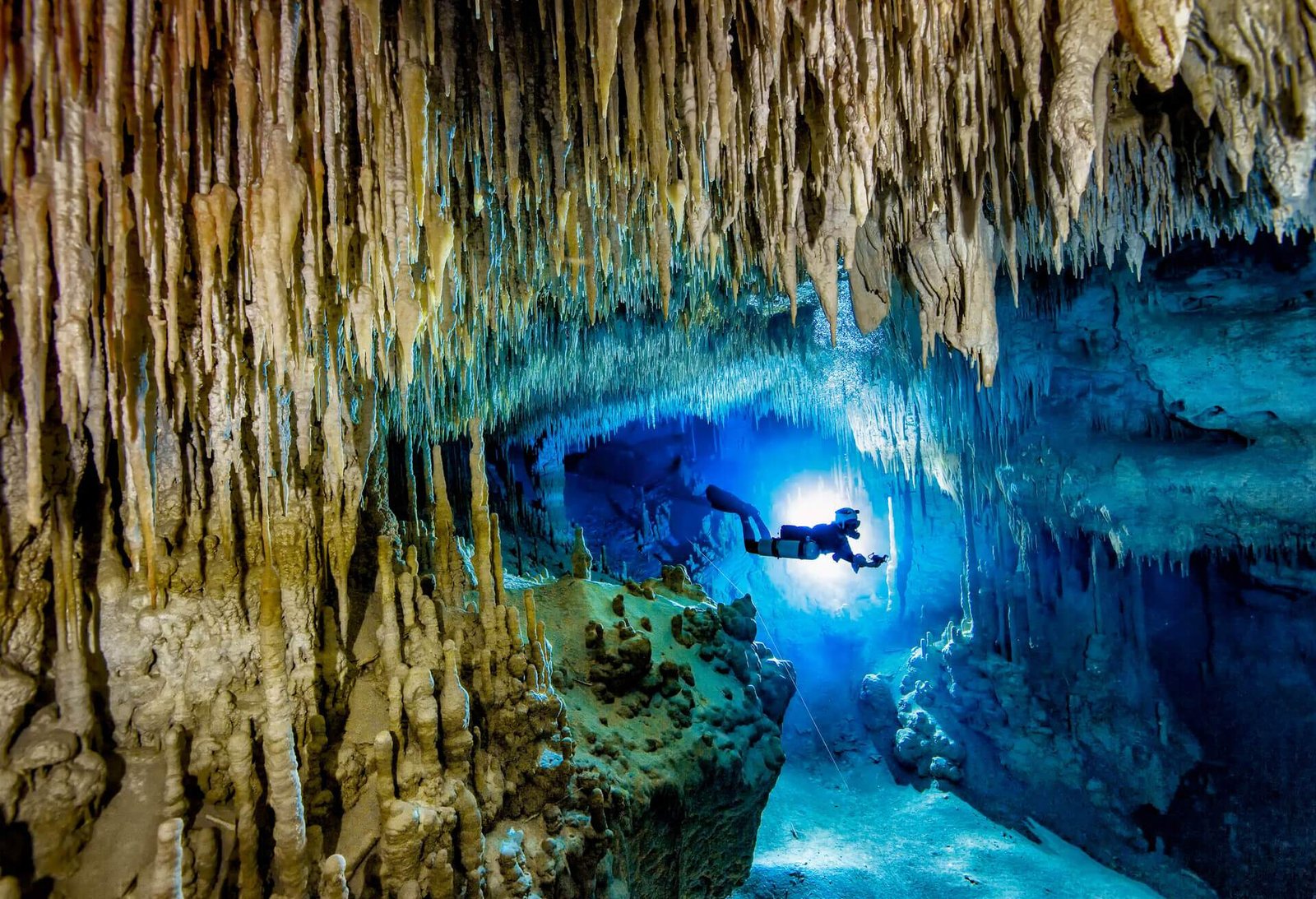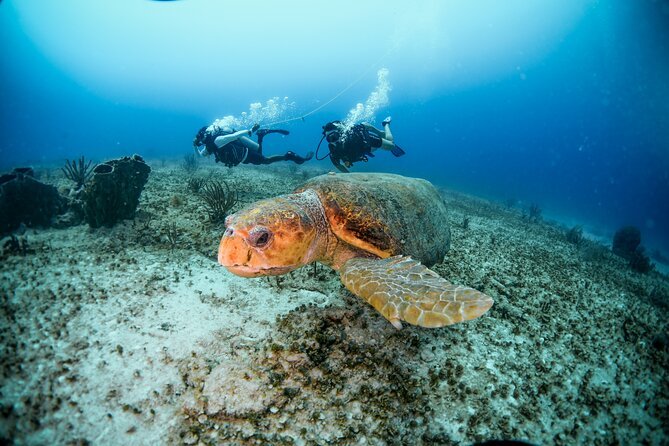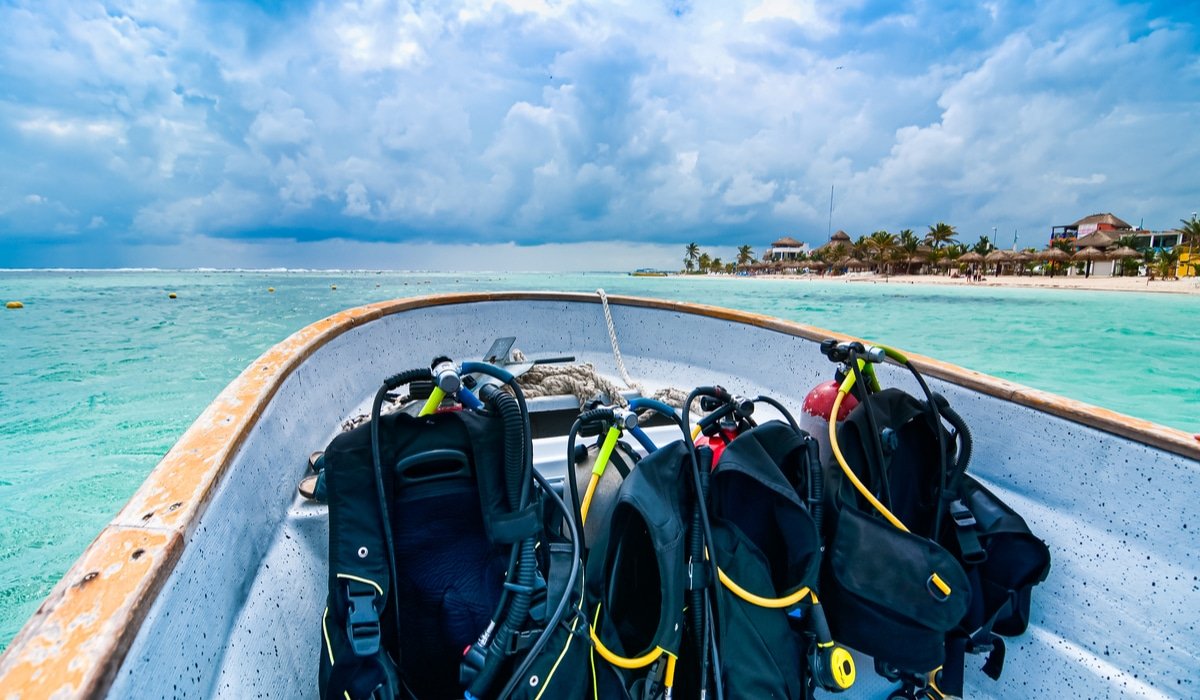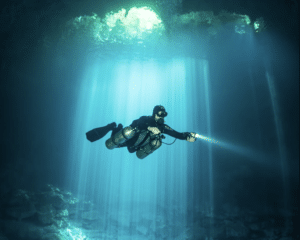Content:
— Scuba Diving in Mérida
— Best Dive Sites in (or Near) Mérida
— How to Get to Mérida
— When to Dive in Mérida
— Where to Stay in Mérida
— What to Bring for Scuba Diving in Mérida
— What Should I Consider for Diving in a Cenote?
— How Much Does it Cost to Dive in Mérida
Scuba Diving in Mérida
Scuba diving in Mérida, despite the city not being directly on the coast, offers unique opportunities that attract divers from around the world.
Mérida is a gateway to some of the most breathtaking cenotes in the Yucatán Peninsula. These natural sinkholes filled with crystal-clear freshwater form a unique underground cave system.
Cenote diving allows you to explore these mystical caverns, revealing stunning rock formations, clear waters, and a sense of adventure like no other.
Mérida’s cenotes offer options for divers of varying experience levels. There are cenotes suitable for beginners, with open water areas and gentle conditions, as well as more challenging cenotes for certified cave divers looking for an advanced adventure.
Worth mentioning that cave diving in Mérida often reaches much greater depths than that in Playa del Carmen, frequently starting around 40 meters and beyond.
Additionally, Mérida is located relatively close to both the Caribbean Sea and the Gulf of Mexico. This proximity provides divers with the opportunity to experience diverse underwater environments.
You can explore coastal reefs off the shores of places like Sisal, Progreso, and the island Alacranes, and then venture into the cenotes, creating a well-rounded diving experience that encompasses both the vibrant marine life of the open ocean and the captivating allure of the cenotes’ hidden world.
Best Dive Sites in (or Near) Mérida
CENOTES
Cenote Kankirixché
The municipality of Abalá, located to the west of Yucatán, is home to the Kankirixche cenote, which translates to ‘yellow fruit’ in Maya, and is known for being one of the ideal spots for diving.
This cenote is semi-open with a vertical drop, equipped with a wooden staircase and platform for accessing the water surface. The water’s color is blue, measuring 25 meters in length by 15 meters in width, with a maximum depth of 50 meters and a minimum of 2 meters.
Inside, it features a cavern at a depth of 50 meters, with expansive underwater galleries and good visibility, making it an ideal site for diving.
Its current use is for tourism, offering optimal conditions for swimming, diving, and observing. It is recommended to use life jackets, avoid the use of sunscreens, and exercise caution while descending the staircase.
Cenote Nah Yah
The Nah Yah cenote is located about 53.6 kilometers from the city of Merida, on the Acanceh-Tecoh road, heading south towards the Telchaquillo community.
It’s a semi-open cenote, with a 9-meter freefall and blue waters, a true testament to the wonders of nature. Its waters are blue, with a maximum depth of 27 meters. It’s one of the most popular for cave diving, although, of course, specialized equipment is necessary, and you must do it with a diving center, holding an Open Water certification as a diver.

Cenote Noh Mozón
The Noh Mozón cenote is of the open type and has a 9-meter freefall. To access it, you have to descend a wooden staircase that ends in a platform for jumping into the water, which has a crystal-clear blue color and a depth of 32 m max depth in the cavern zone and 48 m max depth in the cave zone.
This cenote is one of the lesser-known ones; however, it’s also one of the most beautiful and impressive. Access is a bit tricky; it’s located 71 kilometers from Merida, inside Pixyah. You have to take the Merida-Cancun highway.
Cenote X’Batún
X-Batún is an open-type cenote, which is accessed by a natural slope, and its max depth is approximately 58 meters. It’s one of the few cenotes with vegetation both inside and outside, making it a preferred destination for photography enthusiasts.
Furthermore, due to this same quality of abundant wildlife, it’s an excellent place for diving and observing various species of fish and aquatic plants.
Cenote Dzonbakal
This cenote is perfect for swimming, bird watching, and diving, with an impressive underwater cave awaiting the most experienced divers.
The water, crystal clear and transparent, takes on a fascinating blue tone in its deepest parts. With a length of 25 meters and a width of 15 meters, this cenote offers a minimum depth of .30 meters, ideal for beginners, and a maximum adventurous depth of 30 meters for those seeking deeper exploration.
Cenote Sabak Há
Dive into the mysterious beauty of Cenote Sabak Há, whose name means “dark water,” located in Sacalum, Yucatán, about 70 kilometers from Mérida.
This open cenote welcomes you with a free fall, descending into its depths through a wooden staircase. With an estimated depth of 130 meters, it’s considered the deepest cenote in Yucatán!
Cenote Yaal Utzil
This place is a paradise for cave divers as its depths reach up to 49 meters and it boasts a vast network of both known and unknown caves!
Yaal Utzil is an open cenote with an exciting free fall. To enter its waters, you’ll descend through a 12-meter-long staircase.
BEACHES/REEFS
Sisal
This Yucatecan “Pueblo Mágico,” located just 50 minutes from Mérida, is an underwater paradise.
When we think of diving, the Caribbean always comes to mind, but Yucatán holds a true hidden treasure in Sisal. Immersing yourself in its waters, you’ll encounter a wide variety of fish and other creatures such as sea turtles.
Suddenly, you’ll catch sight of the remains of an old British steamship that used to trade slaves from the recently conquered Yucatán Peninsula. The shallow waters make this tour ideal for families and non-divers to engage in snorkeling and catch a glimpse of some of the ships.
Explore other incredible sites such as a Dutch warship from 1722, a steel fishing boat from about 60 years ago, the sunken 17th-century statue of Jesus, the submerged lighthouse, and more.

Progreso
Diving in Progreso offers a different experience compared to cenote diving and is an excellent option for those looking to explore the Gulf of Mexico. Progreso Beach is known for its shallow and calm waters, making it a suitable spot for beginner divers, snorkelers, and those looking for a more relaxed underwater exploration.
Progreso is approximately 36 kilometers (about 22 miles) north of Mérida. It’s an easy and scenic drive, taking about 30-40 minutes by car via the well-maintained Highway 261.
How to Get to Mérida?
Getting to Mérida, Yucatán is relatively straightforward, and you have several transportation options, including air travel and land routes:
1. By Air: The most common way to reach Mérida is by flying into Mérida International Airport (MID). This airport serves the capital city of Yucatán and its surrounding attractions. If you prefer, you can also fly into Cancún International Airport (CUN) and then travel to Mérida by land.
Mérida International Airport (MID): Located just outside the city, this airport is the primary gateway for travelers heading to Mérida and nearby attractions.
Cancún International Airport (CUN): Although farther from Mérida, Cancún’s airport offers numerous international flights. From Cancún, you can take a bus or rent a car to drive to Mérida, which takes approximately 3-4 hours.
2. By Land: If you’re already in Mexico or prefer a land route, you can take buses or drive to Mérida. There are well-maintained highways connecting Mérida to other parts of the Yucatán Peninsula and the rest of Mexico.
— From Cancún: If you arrive in Cancún, you can take buses, rental cars, or organized tours to Mérida. The ADO bus company offers comfortable and frequent services between Cancún and Mérida.
— From Other Mexican Cities: If you’re coming from another city in Mexico, you can drive to Mérida using the highway network. Keep in mind that the distance can be substantial, so plan your trip accordingly.
Once you’re in Mérida, you can use local transportation, such as buses, rental cars, and taxis, to get around. Many tourists find it beneficial to rent a car, especially if they plan to explore various cenotes, ruins, and attractions outside the city.

When to Scuba Dive in Mérida?
Mérida, Yucatán offers great diving opportunities throughout the year, but the best time to dive can vary based on your preferences and the specific diving experiences you’re seeking.
Here’s a breakdown of the different seasons and their diving characteristics:
1. Cenote Diving: Cenote diving can be done year-round, but the dry season is often preferred for optimal visibility in these freshwater caves. If you’re particularly interested in cenote diving, the months from November to April are recommended.
2. Dry Season Ocean Diving (November to April): This period is generally considered the best time for diving near Mérida. The weather is stable, with less rain and milder temperatures. Water visibility is excellent, making it ideal for both reef and cenote diving. This is also the peak tourist season, so popular dive sites might be busier.
3. Whale Shark Season (June to September): If you’re interested in diving with whale sharks, this is the time to visit. While the most famous whale shark spots are closer to Isla Holbox and Isla Mujeres, it’s possible to arrange excursions from Mérida. It’s a unique and exhilarating experience.
4. Rainy Season (May to October): While the rainy season brings more unpredictable weather and some rain, it can still be a good time for diving. The water temperature is warmer, and marine life activity is higher. However, you might encounter occasional storms, and visibility can vary due to runoff from rain. Keep in mind that some operators may reduce diving trips during heavy rain.
Ultimately, the best time to dive in Mérida, Yucatán depends on your specific interests, comfort with weather conditions, and the type of diving experiences you’re looking for.
Be sure to check with local dive operators for the latest conditions and recommendations based on your chosen diving activities.

Where to Stay in Mérida?
If you’re interested in scuba diving in the Yucatán region, Mérida is a great place to stay. While not directly on the coast, Mérida serves as a central base for exploring the Yucatán Peninsula, offering access to cenotes and providing a rich cultural and historical experience. Here are some options to consider for your stay:
1. Downtown Mérida:
Centro Histórico: Staying in the heart of Mérida provides easy access to historical sites, vibrant markets, and excellent restaurants. You can arrange day trips to nearby cenotes and dive sites from here.
Boutique Hotels: There are many charming boutique hotels in downtown Mérida, offering personalized service and a unique ambiance.
2. Northern Mérida:
Upscale Neighborhoods: Areas like Colonia México and Montejo offer more modern accommodations, including hotels and vacation rentals. These neighborhoods are quieter and offer upscale dining and shopping options.
3. Outskirts of Mérida:
Haciendas: For a unique experience, consider staying in one of the restored haciendas outside Mérida. These historic estates often provide luxurious accommodations and a glimpse into the region’s history.
Tips for Choosing Accommodation
— Proximity to Diving Sites: While staying in Mérida, consider the distance to the cenotes or coastal dive sites you’re interested in. Most dive operators offer transportation from Mérida to these locations.
— Dive Operators: Look for accommodations that have partnerships with local dive operators or offer concierge services to help you arrange diving trips.
— Amenities for Divers: Some hotels cater specifically to divers, offering amenities like equipment storage, rinsing stations, and diving packages.
Booking Tips
— Advance Reservations: Book your accommodations well in advance, especially during peak diving seasons (November to April), to ensure availability and secure the best rates.
— Reviews and Recommendations: Check reviews on travel sites and seek recommendations from fellow divers to find the best places to stay that suit your preferences and needs.
By choosing the right place to stay in Mérida, you can enjoy both the underwater wonders of the region and the rich cultural experiences the city has to offer.
What to Bring for Scuba Diving in Mérida
When preparing for scuba diving in Mérida, it’s essential to have the right gear and necessities to ensure a safe and enjoyable experience.
Here’s a checklist of items to bring:
— Diving Certification: Ensure you bring your diving certification card and any required documentation to show your diving level. However, if you do not have a certification that’s okay! Get certified here!
– Swimsuit: Wear a comfortable swimsuit that you can wear under your wetsuit or diving gear.
— Diving Gear: If you have your own equipment bring them. Otherwise, most dive operators can provide rental gear.
— Underwater camera: You might want to bring an underwater camera and take home more than just memories.
— Sun Protection: Sunscreen, sunglasses, and a hat to protect yourself from the sun during surface intervals. We recommend using biodegradable sunscreen when diving the cenotes. Sadly there is no regulation in place (yet), but the chemicals of normal sunscreens have changed the water quality in the past years.
Remember to double-check with your chosen dive operator about specific requirements and recommendations for diving in the Yucatán, as they may have additional suggestions based on the location, type of dives, and services they offer.

What Should I Consider for Diving In a Cenote?
To dive in any of the cenotes in Mexico, most dive companies will require you to have an open water diving certification. If you have that certification, you’ll be able to dive in the cenotes.
This means you’ll be able to see the natural light source and, therefore, identify the exit to the cavern at all times during the dive.
To fully submerge in the cenote cave system, a cave diving certification will be necessary. If you’re not certified, dive companies also offer certification courses and first time experiences, like DSDs.
Make sure to hire a guide who is fully certified and authorized. A good guide will suggest which cenote is suitable for you based on your diving level and what you’re interested in seeing.
How Much Does it Cost to Scuba Dive in Mérida?
The cost of diving in Mérida can vary widely depending on several factors, including the type of diving you’re interested in, the specific dive site, the dive operator you choose, and the level of services provided.
Here are some approximate price ranges for different types of diving experiences in Mérida:
— Open Water Diving: The cost for a single open water dive in Mérida can range from around $60 to $100 USD on average. This often includes equipment rental, a guide, and boat transportation if necessary.
— Cenote Diving: Cenote diving, being more specialized and potentially requiring additional equipment and training, tends to be more expensive. A single cenote dive can cost anywhere from $100 to $200 USD or more, depending on the complexity of the dive site and the services provided. Keep in mind that guided cave diving, which requires advanced cave diving certification, can cost even more due to the expertise needed for safe exploration.
— Dive Packages: Many dive operators offer packages that include multiple dives at a discounted rate. These packages can be a more cost-effective option if you plan to do several dives during your trip.
— Courses and Certifications: If you’re looking to get certified or take advanced diving courses, the costs can vary. An Open Water Diver certification course can range from around $300 to $500 USD, while more advanced courses like the Advanced Open Water Diver certification or specialty courses might have additional costs.
Check out all our tours and courses here!
Remember that the prices mentioned are approximate ranges and can vary based on factors such as the location of the dive site, the reputation of the dive operator, the level of equipment provided, and additional services like transportation and meals. It’s important to research and compare different dive operators, read reviews, and inquire about what’s included in the price before making a decision.
Additionally, some dive operators might offer discounts for group bookings or for divers who opt for dive packages. Be sure to factor in any potential extra costs, such as equipment rental, tips for guides and boat crew, and any entrance fees for protected areas or marine parks.
Exploring Beyond the Water
In addition to diving, Mérida and its surroundings offer a wealth of cultural and historical activities. Take the opportunity to explore the city’s colonial architecture, enjoy its cuisine, and visit nearby archaeological sites. Each day in Mérida can be a combination of underwater adventure and cultural discovery, making your trip a complete and unforgettable experience.
Check out our Mérida travel guide with the best spots in the city!
Get ready for an unforgettable diving adventure in Mérida, Yucatán!



